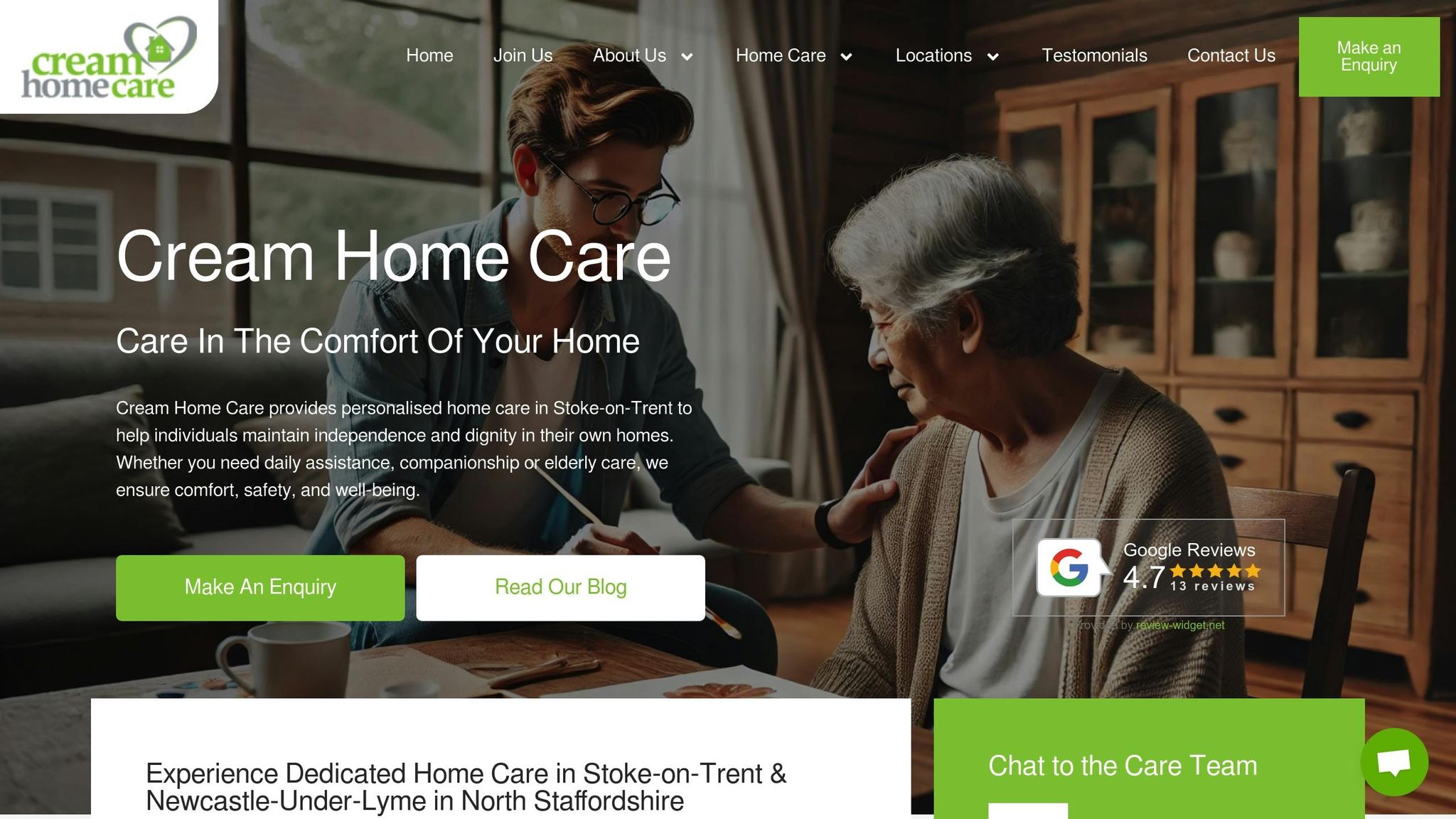Home care offers a practical way to maintain independence and comfort while receiving support in a familiar environment. It’s designed to fit seamlessly into your daily life, respecting your routines and preferences. Here’s what you need to know:
- What Home Care Provides: Assistance with personal tasks, companionship, household chores, medication management, and support for appointments or social activities.
- Benefits: Improves recovery rates, reduces stress, and addresses loneliness while preserving your independence and dignity.
- Customization: Care plans are tailored to your medical, emotional, and personal needs, evolving as your circumstances change.
- Costs and Funding: Hourly rates typically range from $15–$30, with funding options like local council support, Attendance Allowance, or Personal Independence Payment (PIP) available to ease expenses.
- Quality and Safety: Providers like Cream Home Care emphasize caregiver training, regular check-ins, and transparent communication to ensure high-quality service.
Home care is a flexible solution for those seeking professional support without leaving the comfort of their home. Explore services like personal care, companionship, and home help to create a care plan that works for you.
What Is Home Care That Fits Your Needs
Home care goes beyond basic assistance – it’s about creating a support system tailored to your unique medical, emotional, and daily living needs. It takes into account your medical history, current health conditions, emotional well-being, and personal preferences to craft a plan that aligns with your lifestyle.
This approach respects your routines and preferences, ensuring that care integrates into your life without disrupting your independence or dignity. Instead of imposing rigid schedules, personalized care adapts to your way of living, making the experience more comfortable and meaningful.
"Personalised care and support planning is a series of facilitated conversations in which the person, or those who know them well, actively participates to explore the management of their health and well-being within the context of their whole life and family situation." – NHS England
How Home Care Adapts to Individual Needs
Personalized care begins with a thorough assessment of your daily life. Care providers evaluate everything from your medical history and mobility to your personal preferences and social connections. This detailed understanding allows them to design support that feels natural and non-intrusive.
Flexibility is key to this approach. Your care plan evolves with you, adjusting to changes in your health, recovery progress, or mobility. This ensures that your support remains effective and relevant, whether you’re facing new challenges or celebrating improvements.
Caregivers also prioritize safety by conducting home assessments to identify potential hazards and implement practical solutions. These measures help maintain your independence while reducing risks, ensuring you can move freely and confidently in your own space.
Beyond physical health, mental and emotional well-being is a major focus. Personalized care addresses issues like loneliness, depression, and cognitive decline through engaging activities and social opportunities. This balanced approach recognizes that true wellness involves both body and mind.
By adapting to your needs and preferences, personalized care not only provides effective support but also delivers practical benefits.
Main Benefits of Tailored Care
Tailored care offers advantages that go far beyond basic assistance. One of the most important benefits is the preservation of independence. Personalized support allows you to maintain control over your daily decisions and routines, boosting self-esteem and overall satisfaction.
Comfort is another major advantage. Receiving care in the familiar surroundings of your own home, surrounded by your belongings and memories, creates a sense of security that institutional settings simply can’t match. This comfort often leads to better cooperation with care plans and improved outcomes.
Reducing stress is equally important. When care aligns with your natural habits and preferences, it eliminates unnecessary friction. This not only makes life easier for you but also provides peace of mind for your family, knowing you’re receiving care that respects your dignity and comfort.
Statistics underscore these benefits. Nearly 90% of seniors express a strong desire to age in place, while up to 85% of adults over 65 manage chronic health conditions that can benefit from personalized care. Additionally, more than one in three older adults aged 50 to 80 report feelings of loneliness or isolation, which tailored care can address through meaningful companionship and social engagement.
"Personalized care plans are not merely a trend; they are a vital component of modern healthcare that respects and understands the individual needs of each person." – Downers Grove Healthcare
Services Offered by Cream Home Care

At Cream Home Care, these principles come to life through a range of services designed to integrate seamlessly into your daily routine:
- Personal care assistance includes help with bathing, dressing, grooming, and mobility, delivered with respect for your privacy and preferences. These services are scheduled at times that work best for you, ensuring comfort and convenience.
- Companionship services focus on your emotional and social well-being. Caregivers engage in meaningful conversations, participate in activities you enjoy, and provide emotional support, helping to combat loneliness and foster connection.
- Home help tasks cover practical needs like light cleaning, meal preparation, laundry, and household organization. These tasks are handled with care to maintain your routines and preferences.
- Medication management ensures you take the right medications at the right times, with caregivers monitoring for potential side effects or interactions. This service provides peace of mind for both you and your family.
- Support for appointments and social activities helps you stay connected to the world outside your home. Caregivers can accompany you to medical appointments, social events, or shopping trips, ensuring you remain active and engaged in your community.
Cream Home Care serves areas like Stoke-on-Trent, Newcastle-under-Lyme, and North Staffordshire, emphasizing continuity of care. Dedicated staff members build familiarity with your preferences and routines, creating a trusted relationship that ensures your care remains personal and effective.
For more details on how we can support you, visit our Care at Home page.
How to Build Care Around Your Daily Routine
Integrating care into your daily life requires a thoughtful approach that revolves around your unique needs, preferences, and schedule. This involves understanding what works best for you, creating adaptable support systems, and ensuring open communication with everyone involved in your care.
Assessing Your Needs
Personalized care starts with a thorough assessment to align support with your daily habits and natural schedule. During this process, care professionals evaluate key factors like your medical history, current health, mobility, and specific areas where assistance may be needed – such as bathing, dressing, meal prep, or managing medications.
Beyond physical needs, care providers take time to learn about your lifestyle, hobbies, and social connections. They’ll ask questions like whether you’re an early bird or someone who enjoys a slower morning, and how you prefer to spend your downtime. The goal is to ensure your favorite activities and routines remain part of your life.
This assessment also considers your emotional and social needs, including how you communicate, your background, and your existing support network. Financial resources and funding options are also reviewed to strike a balance between what’s needed and what’s feasible.
Aligning Care Plans with Your Routine
Once your needs are clear, the next step is creating a care plan that seamlessly fits into your daily life. The key here is flexibility – your care should feel like an extension of your routine, not a disruption.
For instance, if mornings are your time to ease into the day with a cup of tea and a good book, your care plan can accommodate that. Assistance with dressing, hygiene, and breakfast preparation can be scheduled around your preferred wake-up time.
Afternoon care might focus on household tasks, meal prep, or even accompanying you to appointments, with adjustments based on your energy levels and plans for the day. Evening care could include help with dinner, managing medications, and getting ready for bed. If you prefer a later evening schedule, your care plan can adapt to ensure you remain comfortable and safe.
This approach ensures that your care fits naturally into your life, with room for adjustments as needed. It also lays the foundation for strong collaboration with your care team and family.
Involving Family and Regular Check-Ins
Family involvement is essential for keeping your care plan effective and centered on your changing needs. Relatives often provide valuable insights into your habits, preferences, and subtle changes in your mood or condition that professionals might overlook.
Regular meetings – whether weekly, monthly, or as needed – bring together family members, professional caregivers, and health professionals to review your care plan. These discussions allow everyone to share updates, address concerns, and make adjustments to ensure your care remains aligned with your needs.
Active listening is a critical part of this process. By considering everyone’s input, the care plan can evolve to respect your preferences and address any new challenges. These reviews also emphasize the importance of cultural awareness, ensuring care providers honor your background and values.
This collaborative effort keeps your care plan responsive and personal, preserving the comfort and familiarity of home care. For more details on how we tailor support to fit your lifestyle, visit our Personalised Care Services page. You can also explore our Care at Home service to learn more about our integrated approach.
Types of Home Care Services Available
Cream Home Care provides a wide array of services designed to meet your unique needs – whether you’re looking for help with daily activities, companionship, or specialized medical support.
Personal Care Assistance
Personal care is all about maintaining your dignity and comfort as you go about your daily life. This service includes help with bathing, dressing, grooming, and personal hygiene – tasks that are essential for your well-being but may require extra support.
When it comes to bathing, caregivers prioritize your safety while respecting your preferences. Whether you enjoy a refreshing morning shower or a relaxing evening bath, the timing is tailored to your routine. Dressing assistance is equally thoughtful, considering your clothing preferences, physical needs, and even the weather to ensure you’re comfortable and confident.
Grooming services go beyond the basics, covering hair care, nail care, and even help with makeup or shaving – small details that can make a big difference in how you feel each day. The goal is to help you feel like yourself while preserving the routines that matter most to you.
"Personal care is crucial for enhancing the well-being of individuals receiving support and assistance and should be tailored to meet the needs and preferences of individuals. Through compassionate support and understanding, personal care services can promote a higher quality of life and improved well-being."
– Leaf Complex Care
This level of care not only protects your independence but also ensures you’re ready to make the most of other support services.
Companionship Services
Staying socially connected is key to overall health, and companionship services focus on the emotional and social aspects of care that are often overlooked. These services aim to reduce loneliness and isolation while encouraging meaningful interaction and engagement with the world around you.
Companionship is more than just conversation. It involves sharing activities you love – whether that’s reading, playing games, solving puzzles, or chatting about current events. Caregivers actively participate in your interests, creating moments of genuine connection.
These services can improve mood, sharpen cognitive function, and enhance quality of life. They also give family members peace of mind, allowing them to focus on spending quality time with you rather than worrying about everyday tasks.
Caregivers make these interactions feel natural, blending seamlessly into your daily routine.
Home Help and Medication Management
Practical support is just as important as personal and social care. Home help services ensure your living space stays safe and comfortable, while medication management helps you stay on track with your health routine. Together, they create a solid foundation for independence.
Home help includes light housekeeping, meal preparation, laundry, and general home upkeep. Caregivers work with you to prepare meals that are both nutritious and tailored to your dietary needs, whether you prefer hearty classics or lighter dishes.
Medication management ensures you never miss a dose. Caregivers provide reminders, organize pill boxes, and help with prescription refills. They also monitor for side effects and can communicate any concerns to your healthcare provider.
This combination of services helps maintain a safe, organized home environment while supporting your overall well-being.
Support for Appointments and Social Activities
Staying connected to your community and managing healthcare needs is easier with transportation and appointment support. These services help you attend medical appointments, social gatherings, and community events without the hassle of driving or navigating public transit.
Caregivers assist with transportation, paperwork, and communication during healthcare visits. They can take notes, remind you of questions to ask, and ensure you understand any new instructions from your doctor.
Support for social activities includes outings to community events, religious services, shopping trips, or visits with loved ones. This service helps you maintain the connections and activities that bring joy and fulfillment to your life, all while ensuring you feel safe and comfortable.
These services work together to create a flexible support system that enhances your quality of life without disrupting your daily routine.
For more details about how Cream Home Care can assist you, visit our Home Care Services page or explore our Care at Home page for personalized options.
sbb-itb-eeb104e
Understanding Costs and Funding for Home Care
Navigating the costs and funding options for home care can feel overwhelming, but understanding these factors is key to making informed decisions. While expenses vary across the UK, knowing what to expect and exploring funding opportunities can make care more manageable. Here’s a closer look at the cost structure and available funding options.
Home Care Costs Explained
The cost of home care depends on several factors, including location, the complexity of care, and the time of service. Typically, hourly rates range from £15 to £30, with an average of £20–£25 per hour.
Rates can fluctuate based on the time and day. Services provided during evenings, weekends, or holidays often come with higher fees. Basic companionship care is generally less expensive than specialized services, such as personal care or medication management.
For individuals requiring constant support, live-in care is an option. Weekly costs for live-in care typically range from £800 to £1,600, depending on the level of care needed. In some cases, this can be a more economical choice compared to multiple daily visits, especially for those with more complex needs.
Location also plays a significant role in determining costs. Urban areas and regions with higher living expenses tend to have higher care rates, while rural areas may have different pricing structures due to factors like travel time and caregiver availability.
To budget effectively, start by listing essential expenses and identifying areas where adjustments can be made. This approach can help you allocate resources for care while maintaining your overall quality of life.
Funding Options and Eligibility
There are several ways to make home care more affordable, starting with support from your local council. The first step is to request a free care needs assessment, which determines your eligibility for council funding.
If eligible, a financial assessment (or means test) will follow to calculate your contribution. The level of support you receive depends on your capital, with thresholds varying across the UK:
| Region | Upper Capital Threshold | Lower Capital Threshold |
|---|---|---|
| England | £23,250 | £14,250 |
| Wales | £24,000 (home care) | £24,000 |
| Scotland | £35,000 | £21,500 |
| Northern Ireland | £23,250 | £14,250 |
If your capital exceeds the upper threshold, you’ll typically need to fund your own care. Below this amount, the council may contribute, but you may still need to pay a portion from your income. The council ensures that your income doesn’t fall below the minimum income guarantee of £232.60 per week if you’re single and above State Pension age.
You may also qualify for benefits that can help cover care costs without a means test. For example:
- Attendance Allowance and Personal Independence Payment (PIP) provide financial support for care-related expenses.
- Carer’s Allowance is available for those who spend at least 35 hours per week caring for someone, subject to eligibility.
Another flexible option is direct payments, which allow you to manage your personal care budget while maintaining the same level of support.
For advice on benefits and care costs, organizations like Age UK, Independent Age, and Money Helper can provide valuable guidance. For more details on how we personalize home care services, visit our Cream Home Care homepage.
Link to Care at Home Services
At Cream Home Care, we create care plans that align with both your needs and budget. Our team is here to help you navigate how different service options affect costs and to maximize any funding you’re entitled to.
Whether you’re self-funding or receiving council assistance, our Care at Home services are designed to deliver excellent care without compromising on quality. We believe everyone deserves access to compassionate home care, regardless of their financial circumstances.
If your savings are approaching the capital threshold, planning ahead can help ensure a smooth transition to funded care when the time comes.
Quality and Safety in Home Care
At Cream Home Care, we place a strong emphasis on quality and safety, ensuring that every aspect of our service is tailored to meet the needs of each client. From the initial assessment to ongoing care, our approach focuses on personalized attention, rigorous staff training, continuous monitoring, and open communication with families.
Staff Training and Supervision
The heart of quality home care lies in the skills and dedication of caregivers. At Cream Home Care, our staff undergoes extensive training that goes beyond standard requirements. This training not only covers technical skills but also emphasizes a person-centered approach to care.
Caregivers are trained to understand each client’s unique routines, preferences, and habits. They follow strict hygiene protocols and provide care that respects the individual’s dignity and personal needs, avoiding a one-size-fits-all approach.
To maintain high standards, we conduct regular check-ins and supervision. These include discussions about challenges, sharing best practices, and observing caregivers to ensure they’re using proper techniques. Accurate documentation and reporting are also key parts of the training. Caregivers learn how to record and communicate changes in a client’s condition, behavior, or appetite promptly, ensuring that families and healthcare providers stay informed.
For more details about our approach to staff training and support, visit our Staff Training & Support page.
Monitoring and Adjusting Care Plans
As client needs evolve, their care plans must adapt. At Cream Home Care, we conduct regular reviews and adjustments to ensure care remains effective. Scheduled evaluations take place at least every 90 days, with more frequent assessments when health conditions change.
Our monitoring process is supported by technology, using electronic documentation systems to track care patterns and flag potential issues early. This proactive approach ensures that care remains responsive and consistently meets high standards. These regular reviews, combined with transparent safety protocols, help maintain client well-being and security.
Transparency and Safety Measures
Open communication with families is a cornerstone of our care philosophy. We keep families informed with regular updates, detailed reports, and easy access to communication channels. This transparency builds trust and helps families stay involved in their loved one’s care.
Safety begins with comprehensive home assessments to identify and address potential hazards, such as fall risks or unsafe kitchen and bathroom setups. Caregivers are trained to manage these risks and secure potentially dangerous items appropriately.
Families receive updates on daily care activities, health observations, and any concerns, ensuring they’re always in the loop. Proper documentation is shared to provide a clear picture of the care being delivered and how the client is responding.
Our safety protocols also include measures like skin care for immobile clients to prevent issues such as skin breakdown. Caregivers monitor for signs of health changes, including an increased risk of urinary tract infections, which are more common in females.
Emergency procedures are clearly outlined and communicated to both staff and families. Caregivers are well-prepared to handle unexpected situations, knowing when to involve healthcare professionals or emergency services. This ensures clients receive the right care when it’s needed most.
Medication management is another critical area where we maintain strict protocols. Only certified staff handle medication-related tasks, ensuring safety and compliance with regulations.
By implementing these comprehensive quality and safety measures, Cream Home Care provides reliable, personalized care that evolves with the client’s needs. Families can feel confident knowing their loved ones are in capable hands.
To learn more about our personalized home care services, visit our Care at Home page.
Conclusion: Peace of Mind with Home Care
Choosing home care is about prioritizing independence, dignity, and quality of life for your loved ones. As we’ve discussed, personalized care fits seamlessly into individual routines, creating a supportive environment that balances independence with safety and well-being.
Home care goes beyond just providing assistance. It allows individuals to remain in familiar surroundings while receiving professional, tailored support. Whether it’s help with daily activities, personal care, or companionship, the right care plan transforms everyday life into moments of connection and comfort – all within the security of home.
Cream Home Care exemplifies this compassionate, person-centered approach. With a 4.7-star Google rating from 13 reviews, families frequently highlight the professionalism and dedication of both carers and office staff. As one satisfied customer, Hattie Welch, shared:
"Very professional & supportive company both carers and office staff. They went above and beyond with our requirements to ensure all need would be met. Carers are respectful, very professional and supportive making sure her needs are met."
This kind of feedback reflects the commitment to continually refining care plans to meet evolving needs. Through rigorous training and regular reviews, Cream Home Care ensures that services remain adaptable and effective.
Families across regions, including Newcastle-under-Lyme, benefit from these high standards. For those in Stoke-on-Trent, Newcastle-under-Lyme, and North Staffordshire, professional home care offers a way to maintain independence while ensuring reliable support. Specifically, residents in Newcastle-under-Lyme can explore the dedicated Care at Home service to meet their needs.
Knowing your loved one is cared for with respect, in the comfort of their own home, brings true peace of mind. With flexible scheduling, experienced carers, and customized care plans, home care fosters meaningful connections while preserving dignity and independence.
To learn more about services designed around individual needs and family involvement, visit our Home Care Services page.
FAQs
What makes personalized home care different from traditional care services?
Personalized Home Care
Personalized home care is all about crafting care plans that align with an individual’s specific needs, preferences, and daily habits. Unlike the one-size-fits-all approach often seen in traditional care settings, this method adjusts to fit each person’s unique lifestyle and personal goals.
Delivered right in the comfort of one’s home, this type of care provides flexibility and a range of services. These can include help with everyday tasks, medication reminders, or even specialized care for conditions like dementia. By focusing on what matters most to the individual, personalized home care creates a more supportive and comfortable environment compared to the more rigid structure of traditional care facilities.
What should I look for in a home care provider to ensure quality and safety?
When choosing a home care provider, focus on their qualifications, certifications, and adherence to state regulations – these are strong indicators of their dedication to safety and quality care. Make sure the caregivers have undergone comprehensive background checks and are properly trained for the role.
It’s also wise to seek out agencies that prioritize clear communication and offer customized care plans designed to fit individual needs. Checking client reviews and testimonials can give you a better sense of their dependability and the quality of their services. By taking these steps, you can find a provider that offers professional, secure, and personalized care for your loved one.
What financial support is available for home care, and how can I check if I qualify?
Financial help for home care in the UK can come from several sources, such as local council funding for those with assets under £14,250, NHS Continuing Healthcare, or benefits like Carer’s Allowance. Your eligibility generally depends on factors like your care needs, income, and total assets.
To check if you qualify, a care needs assessment is usually required. This assessment, arranged through your local council, evaluates the level of care you need and whether you’re eligible for funding. For tailored advice, it’s worth reaching out to your local council or NHS services to explore your options based on your specific situation.






